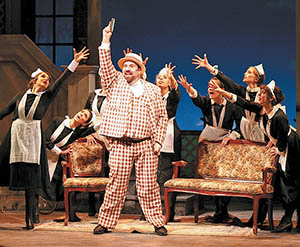




There could not be a more fitting venue than the Edmond Safra Hall at the Museum of Jewish Heritage for the recent debut of “Di Goldene Kale” (The Golden Bride). The National Yiddish Theater Folksbiene (NYTF) rescued this 1928 hit, which originally played to audiences of 2,000 on the Lower East Side of Manhattan. Its score and libretto were lost for 70 years, until music archeologist Michael Ochs and his team pieced it back together. The Museum of Jewish Heritage is celebrating its inaugural year as the host of NYTF and looks forward to staging many works of Jewish theater which will revisit the rich Jewish culture and heritage from years past for contemporary audiences. “The Golden Bride” will run through January 3, after which it will be performed elsewhere in the U.S. and in Europe.
Playful, pretentious, fanciful and farcical, the play provides an evening of sheer joy. The score for this golden age romantic comedy was marvelously composed by music virtuoso Joseph Rumshinsky. The young cast of 20, for whom Yiddish was a foreign tongue just one month ago, has succeeded in conveying the youthful, naive optimism of the shtetl in Russia and other parts of Eastern Europe, when it was believed that there would be an immersion of wealth into their lives by rich American benefactors.
Goldele, the kallah (bride), comes into an extravagant inheritance left to her by her deceased father. She must join her rich uncle in America to claim her fortune but first engages three suitors to find her real mother who had been lost to her since her youth. She promises to marry the suitor who succeeds in this mission. In truth, her heart belongs only to Misha, the son of her adoptive parents and constant childhood companion. Through a series of comic events and coincidences, Misha discovers Goldele’s real mother, brings her to America and claims his bride.
The character of Misha is played by Cameron Johnson, whose rendition of Friday night kiddush rivals renowned chazanim (cantors). The audience reaction was clearly one of enthusiasm and enjoyment.
Bruce Rebold, who portrays family patriarch Pinchas, commented that his apparent mastery of Yiddish came in part from his grandmother, who occasionally used Yiddish words, but mostly from his nightly repetitions of his lines in order to improve his intonation.
The troupe, under the direction of Motl Didner and NYTF executive director and co-director of the play Bryna Wasserman, imported Idit Kupfer from Montreal. Kupfer had worked with Wasserman at the Yiddish Drama Group in Montreal, and her role was specifically to work with the actors, teaching them to speak Yiddish words with the proper intonation as if it was their native tongue.
Cameron Johnson, who is not Jewish and played the role of Misha, explained that he decided to read for a role in the Yiddish Theatre in the first place simply because his agent said “get over there and try it.” His performance was spectacular.
When asked how she found this collection of performers, Wasserman answered, “Audition, audition, audition.”
This Yiddish operetta brought back fond and nostalgic memories of the “old country” through familiar melodies taken from Jewish liturgy, local folk tales, dances and songs. It also introduced the “new world” in an optimistic and hopeful light.
According to Wasserman, “When the operetta was first produced, the U.S. was in the midst of the Great Depression and needed to believe in the American dream. Who needed this most but the new immigrants who left their native homelands and landed in the depressing streets and tenements of the Lower East Side.”
Teaneck resident Zalmen Mlotek is the play’s music director as well as NYTF artistic director. As artistic director, Mlotek is an internationally recognized authority on Yiddish folk and theater music. He is credited with having brought Yiddish and Klezmer music to Broadway and off-Broadway stages. This past June he arranged for the celebration of the 100th anniversary of the Folksbiene Theater in Central Park together with an exciting array of talented Jewish singing stars. In “The Golden Bride,” he leads an orchestra of 14 musicians with passion and sensitivity through the lively and lilting tunes of the European shtetl. Placed behind a gauze curtain, the audience catches glimpses of the musicians throughout the play.
In no way should anyone be deterred by the fact that this play is in Yiddish. There is English translation shown above the stage at all times and, for those who prefer, there is also Russian translation. Regardless of which language is preferred, this play is worth seeing. Audience members will leave the performance smiling and looking forward to another performance by this outstanding troupe.
At the conclusion of the debut performance on Wednesday evening, December 9, the audience was invited to a dessert reception, at which time they were notified that the play had just been awarded the NY Critics Award.
When approached by this paper for a comment about this new recognition, a delighted Mlotek was brief and to the point, “Just go home to Teaneck and tell them to come before January 3. We are waiting to greet them.”
The Museum of Jewish Heritage is located at 36 Battery Place. For reservations call 866 811 4111.
By Nina Glick and Pearl Markovitz













